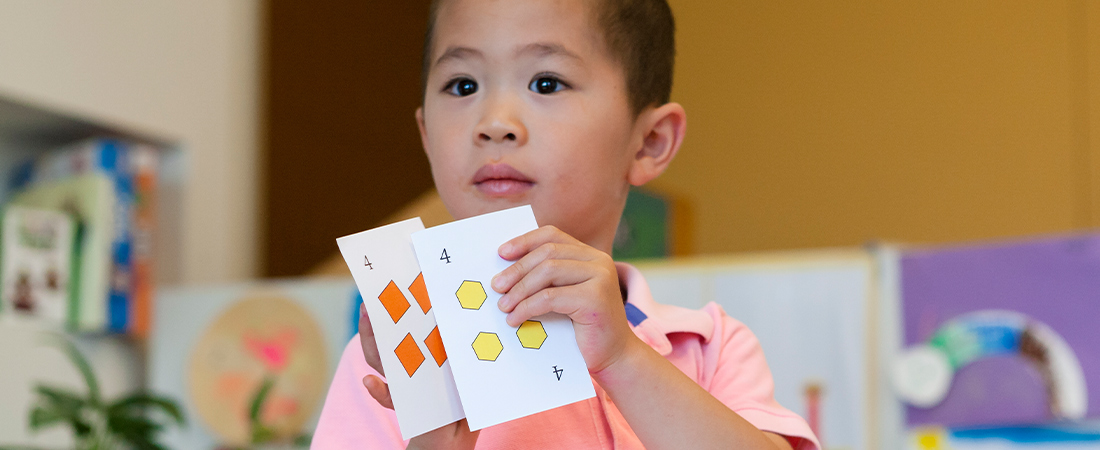3 Ways to Promote Social and Emotional Learning through Math

Strong students are often able to persevere through difficult academic challenges, even if they don’t get the correct answer. So what drives them to do that? According to EDC’s Shai Fuxman, a behavioral health researcher, it’s due to social and emotional learning (SEL) skills.
“Those skills we consider to be under the social and emotional learning umbrella—creative thinking skills, self-efficacy skills, perseverance—make you a better mathematician, a better scientist, a better writer, a better student overall,” Fuxman says.
EDC’s Jessica Young, a developmental psychologist and mathematics researcher, agrees that SEL skills support mathematics success.
“There’s a deep connection between persistence and math,” she says. “Being able to encourage that persistence is where those social and emotional learning skills come in."
Young and Fuxman say that parents and educators can play an important role in promoting SEL, especially with respect to mathematics learning. Here, they present three ideas.
1. For young children: Focus on games, puzzles, and origami
Simple board and card games are a good way to connect mathematics and SEL for young children, says Young. Games help children identify and learn about patterns, number sense and spatial sense, but they also promote self-regulation, turn-taking, fair play, and learning from mistakes.
“For preschoolers, games teach how to take turns, how to wait your turn, and how to win and lose graciously,” says Young. “By playing games, you are not only teaching those math skills but also supporting those approaches to SEL learning.”
In addition to games, Young says that doing puzzles and folding origami figures are great ways to promote the mathematical skills of spatial relationships and geometric reasoning. Puzzles also help children see the fun and beauty in math and to find satisfaction in solving a challenging problem. These activities also support mathematical habits of mind that are needed to be successful in math, like problem-solving, patience and perseverance—which are also important social and emotional skills.
2. For middle schoolers: Solve non-mathematical problems
Tweens may not be as enthusiastic about playing mathematical games, but parents can still promote valuable SEL habits through activities that encourage problem-solving, even if they are not explicitly about mathematics, says Fuxman.
“If I am having a problem with the computer or the television, my son will immediately come over and help me,” he says. “He has this notion, as a lot of kids do, that ‘this is a problem I can help with, and I’m going to stick with it until I get to the end.’”
Problem-solving and persistence are both social-emotional skills that are key to success in mathematics. The process of identifying a problem, looking for a solution, and persisting despite obstacles is highly relevant to learning mathematics. Parents can use these experiences as an opportunity to talk about persisting in mathematics—especially with students who feel like they struggle to do math.
“You can have conversations about how math is challenging, but challenges are fun,” says Fuxman. “If students can transfer that problem-solving motivation to math, then that can help them become better mathematicians.”
3. For learners of all ages: Encourage growth mindset
One of the most important things that parents can do to support their children’s mathematical development is to promote a growth mindset about mathematics learning. Developed by the psychologist Carol Dweck, growth mindset refers to a person’s belief in their own ability to learn new things through practice and hard work. (Dweck contrasts this with a fixed mindset, where people believe their intelligence is innate.) In fact, a growth mindset about learning mathematics has been positively associated with higher achievement in mathematics.
To foster a growth mindset at home, parents can talk about mathematics as a puzzle or a challenge—a subject that requires some creative thinking, but one that can be figured out with effort and persistence. Parents can also replace generic praise, like ‘Great job!’, with descriptive statements about children’s choices and efforts.
Young says establishing a growth mindset is especially important in the early years.
“By approaching math with a growth mindset, teachers and families can help prevent kids from ending up with anxiety about math, or that feeling that some people are good at it and some are not.”
Young also points to recent research that shows mathematical mistakes actually cause the neurons in our brains to spark. This creates new neural networks that pave the way for new ideas and knowledge. Seen this way, mistakes become an opportunity to talk about students’ knowledge, questions, and evolving ideas about mathematics.
“Getting kids to see mistakes not as failures but as opportunities to learn is really important, so that children can persist through that struggle,” Young says.
The overall theme behind all of these ideas? When children learn to persist, make mistakes, and have a positive attitude about learning, they are developing SEL skills that will help them succeed well beyond mathematics class.
"By being intentional about how we infuse SEL into math instruction, we are equipping students with the additional set of skills they need to be better mathematicians, or to think mathematically, in addition to do the actual math skills,” says Fuxman.

